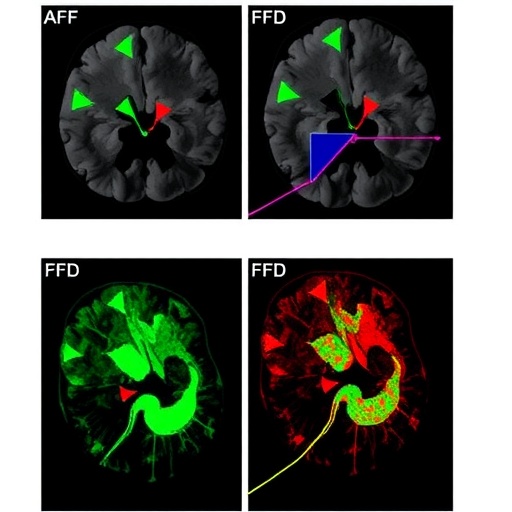In a groundbreaking advancement in the fight against glioblastoma, a recent study reveals the promising potential of targeting fibroblast growth factor receptors (FGFRs) to enhance the effectiveness of tumor treating fields (TTFields). This innovative research opens a new therapeutic avenue that could significantly improve outcomes for patients diagnosed with one of the most aggressive and treatment-resistant brain cancers. Glioblastoma stem cells (GSCs), notorious for their resilience and ability to propagate tumors, are particularly susceptible to this combined approach, signaling a hopeful shift in therapeutic strategies.
Glioblastoma remains one of the deadliest central nervous system malignancies, with standard treatments often falling short due to the tumor’s intrinsic heterogeneity and the adaptive capabilities of cancer stem cells. These GSCs contribute to tumor recurrence and resistance against conventional therapies such as chemotherapy and radiotherapy. In light of this challenge, novel modalities like TTFields, which use alternating electric fields to disrupt cancer cell division, have been integrated into clinical practice with moderate success. However, resistance mechanisms within GSC populations continue to limit their full efficacy.
The recent investigation, led by Deshors, Kheil, Ligat, and colleagues, elucidates the role of FGFR signaling pathways in mediating glioblastoma stem cell survival and resistance to TTFields. FGFRs, a family of receptor tyrosine kinases, are implicated in various cellular processes including proliferation, differentiation, and survival. Aberrant FGFR activation is commonly observed in glioblastoma, contributing to malignant progression and therapeutic resistance. By pharmacologically inhibiting FGFR activity, the researchers aimed to disrupt these survival pathways and sensitize GSCs to the cytotoxic effects of TTFields.
.adsslot_au5PU1AQTc{ width:728px !important; height:90px !important; }
@media (max-width:1199px) { .adsslot_au5PU1AQTc{ width:468px !important; height:60px !important; } }
@media (max-width:767px) { .adsslot_au5PU1AQTc{ width:320px !important; height:50px !important; } }
ADVERTISEMENT
At the molecular level, FGFR blockade appeared to interfere with key downstream signaling cascades, notably the PI3K/AKT and MAPK/ERK pathways, which are critical to cell survival and proliferation. This interference led to impaired cell cycle progression and heightened sensitivity to the mechanical stresses imposed by TTFields. Furthermore, the dual treatment reduced markers of stemness within glioblastoma populations, suggesting a direct impact on the tumor-initiating cell compartment that is often responsible for recurrence.
The researchers also explored the implications of their findings in tumor microenvironments, noting that FGFR inhibition modulates not only intrinsic cellular signals but also the crosstalk between glioblastoma stem cells and their niche. This disruption of niche interactions may further compromise the protective mechanisms that shield GSCs from external assaults, thereby amplifying the therapeutic effect of TTFields. Such insights highlight the complexity of glioblastoma biology and the necessity of multidimensional treatment approaches.
The innovative nature of this research lies in its departure from traditional one-dimensional therapeutic paradigms. Instead, it embraces a multi-modal assault on glioblastoma stem cells, which concurrently targets biochemical signaling and physical mitotic processes. This paradigm could herald a new era where integrative therapies are optimized based on an enhanced understanding of tumor physiology and stem cell vulnerabilities.
Beyond glioblastoma, the modulation of FGFR signaling offers potential applicability across a spectrum of malignancies where cancer stem cells drive disease persistence. The findings encourage exploration into combinatorial treatments that pair targeted kinase inhibition with emerging physical and biological therapies, potentially reshaping the oncological landscape.
The significance of this study also extends into the realm of personalized medicine, as FGFR expression and activation profiles vary among glioblastoma patients. Stratifying patients based on FGFR pathway dysregulation could refine therapeutic regimens, ensuring maximal benefit while minimizing unnecessary exposure to treatments unlikely to be effective. This precision approach aligns with contemporary trends in oncology aimed at tailoring interventions to tumor-specific characteristics.
Moreover, the mechanistic insights afforded by this research deepen our comprehension of how glioblastoma stem cells evade current therapies. By dissecting the interplay between oncogenic receptor signaling and susceptibility to electric field-based therapies, the study unravels new biological vulnerabilities that can be exploited therapeutically. This enhanced understanding fosters innovation in drug development and treatment design.
The translation of these findings into clinical practice could potentially alter the prognosis of glioblastoma patients, who currently face a median survival of merely 15 months despite aggressive treatment. Enhancing the efficacy of TTFields through FGFR inhibition might extend survival, improve quality of life, and reduce relapse rates associated with glioblastoma’s notorious recurrence.
This research also fuels optimism about overcoming the blood-brain barrier challenge that often hampers effective delivery of therapeutic agents to brain tumors. The molecular inhibitors targeting FGFRs can be designed for optimal brain penetration, and TTFields therapy is non-invasive and highly localized, together representing a compelling strategy that balances efficacy and safety.
In conclusion, the study by Deshors and colleagues marks a pivotal step toward more effective glioblastoma treatments by demonstrating how FGFR inhibition can sensitize glioblastoma stem cells to tumor treating fields. This dual targeting strategy exemplifies the convergence of molecular biology and biophysical therapy to tackle the formidable challenge posed by glioblastoma, offering renewed hope in the quest for durable cancer control and improved patient outcomes.
Subject of Research:
Glioblastoma stem cells and their sensitization to tumor treating fields via FGFR inhibition.
Article Title:
FGFR inhibition as a new therapeutic strategy to sensitize glioblastoma stem cells to tumor treating fields.
Article References:
Deshors, P., Kheil, Z., Ligat, L. et al. FGFR inhibition as a new therapeutic strategy to sensitize glioblastoma stem cells to tumor treating fields. Cell Death Discov. 11, 265 (2025). https://doi.org/10.1038/s41420-025-02542-5
Image Credits: AI Generated
DOI:
https://doi.org/10.1038/s41420-025-02542-5
Tags: cancer stem cell resiliencecentral nervous system malignanciesenhancing cancer treatment outcomesFGFR inhibition in glioblastomaFGFR signaling pathways in cancerglioblastoma stem cell therapyglioblastoma treatment resistanceinnovative cancer therapiesnovel glioblastoma treatment approachestargeting fibroblast growth factor receptorstherapeutic strategies for glioblastomatumor treating fields effectiveness





